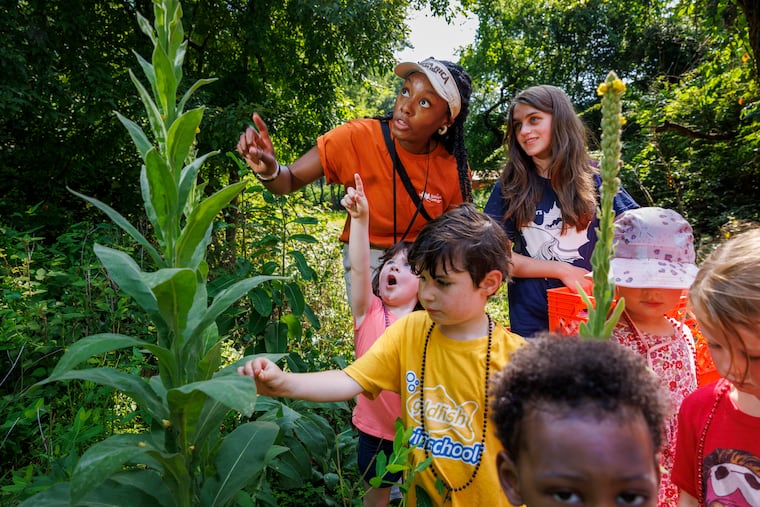My summer job: A South Philly educator goes to the forest, taking hikes with tikes at Camp Schuylkill
“I like being active. I like being outdoors a lot,” says Sariah Cochran, “and that’s somehow my job.”

My Summer Job is a weekly series that explores the jobs of seasonal workers in Philadelphia. Each week, we’ll share stories from a typical day in the life of the people who make summer happen in the region.
Sariah Cochran and her fellow counselors brought their campers to attention on a Thursday morning by calling out “Where are all the ducks?” The small group of young children looked to the adults and began to quack.
“The kids love to quack,” Cochran remarked, smiling. “They don’t get to quack at school.”
Cochran, similarly, is spending her summer embracing a break from the school environment. The 24-year-old is a behavior technician at a Philadelphia charter school during the academic year. But this summer she’s working as a counselor at Camp Schuylkill.
The summer day camp hosts 150 children aged 4-12 each day, who explore the 365 acres of preserved land at the Schuylkill Center for Environmental Education. Guiding them are counselors like Cochran, who leads the 4-to-5-year-old Crawling Caterpillars along with two other counselors.
The Inquirer joined Cochran and the Caterpillars for a morning at camp to see the work that goes into helping young people explore the wilderness.
A typical day
Counselors arrive between 8:15 a.m. and 8:30 a.m. For Cochran, this means waking early to fuel up with coffee and breakfast, feed her cats and take public transit from her South Philadelphia neighborhood, near the stadiums, to Roxborough.
As the counselors for each age group solidify their plans for the day, the campers begin to arrive. The number of children in this group fluctuates week to week, with a maximum of 18, Cochran said.
The adults try to make each weekday unique, by doing different kinds of hikes and activities through the center’s many acres of forest. Some days they climb trees, and some days they play in the water and have popsicles.
“We want to make sure that we’re sharing all the spaces so that every kid here can experience a little bit of everything,” Cochran said.
But routine is important, especially for the youngest campers, she added. Each day’s activities are punctuated by regular water breaks, snack times, lunch ,and an afternoon siesta.
Campers are picked up at 3:30 p.m., and counselors spend the next hour preparing for the next day. By 4:30 p.m., Cochran is on her way home to enjoy some summer fun of her own with friends in South Philly.
Why this job?
During the school year, Cochran works with students who have individualized educational plans to make sure they have needed resources. Last year, she did similar work during the summer as well.
“I felt kind of burnt out at the start of the next school year,” Cochran said. “I love working with kids. That’s what I want to do long term...but I need a change of environment so I can still bring my best self to the school year.”
At camp, her hours are about the same. But it feels less like work.
“Physically, I’m tired, but emotionally, I feel very rejuvenated,” Cochran said. “It pays my rent for the summer, but I’m still having fun.”
Workplace culture
Cochran described the Camp Schuylkill day as being “centered toward fun.” Though there’s plenty of learning, too. Sometimes the campers even step into the role of teacher, pointing out plants or flowers they recognize.
“Some of the kids have been here since pre-school, so some of them know more than I do,” Cochran said.
On a Thursday morning, after gathering all of the Caterpillars and playing a short game, the group set off on a walk to the rock pile, their usual Thursday destination. The steep-downhill hike might only take a few minutes for an adult moving apace, but the children and their counselors stop frequently to examine plants and flowers, occasionally crowding over a laminated map of the forest to double-check their route.
When they arrived in a clearing at the bottom of the hill, the campers eagerly swarmed to the rock pile — a collection of boulders stacked into a structure that almost looks like it could have occurred naturally.
As the children climbed, crawled, and balanced among the rocks, Cochran joined them, occasionally reminding campers not to wander too far and remarking on their strategies for negotiating the rough surfaces. She likes to ask leading questions like “How is your footing?” or “Do we know how to get down from there?” to get them thinking about how to explore the forest safely.
“Kids are going to want to do riskier stuff, and as long as you know the risk beforehand, allow them to try and figure that out because the more you say no, the more they’re gonna wanna try to do it when you’re not looking, which is when things get dangerous,” she said.
Pros and cons
Counselors at Camp Schuylkill walk four or more miles a day with their campers, easily, Cochran said. It’s physically tiring, but she doesn’t mind that, she said, though she does have to make sure to get a full eight hours of sleep to recover.
The most challenging moments at this job, she said, are when the campers are stuck inside because of the weather. During a day in June when the air quality was poor due to smoke blowing in from Canadian wildfires, they were forced inside for an entire day. They spent the day making crafts, like friendship bracelets and turtles made of yarn.
But generally, Cochran said, it’s hard to think of her days at camp as work. Oftentimes on the job, she finds herself feeling relaxed.
“I like being active. I like being outdoors a lot,” she said, “and that’s somehow my job.”